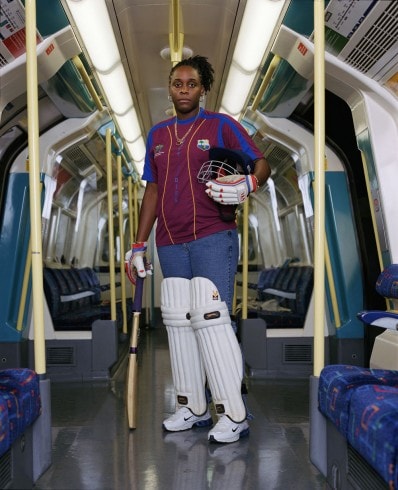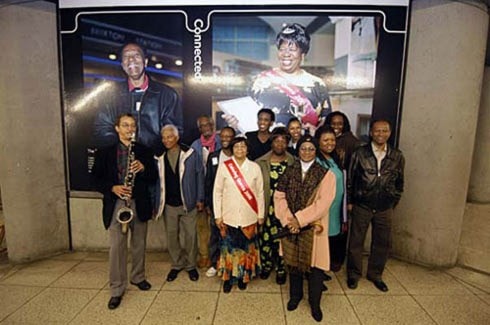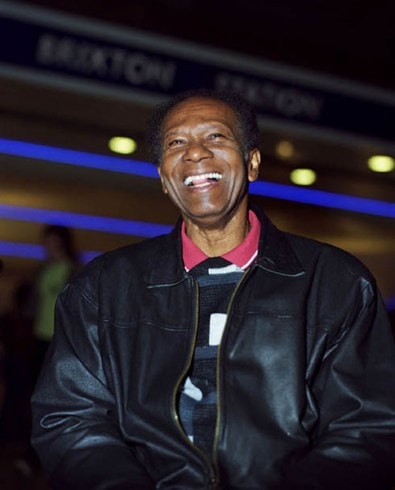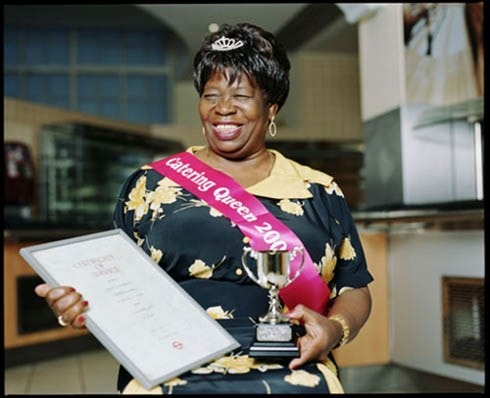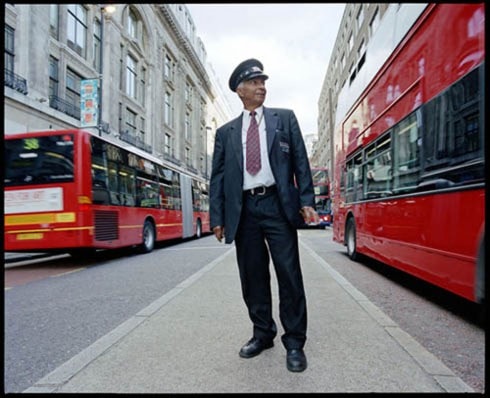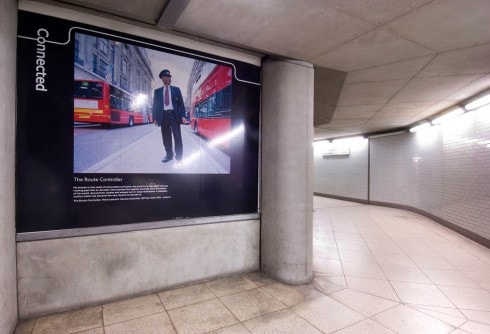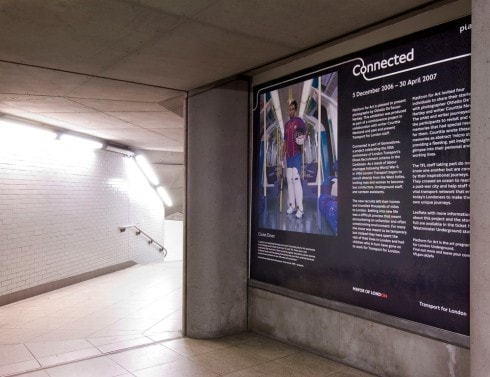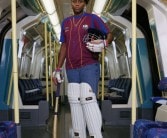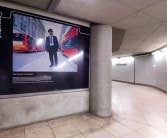Platform for Art is pleased to present photographs by Othello De’Souza-Hartley. This exhibition was produced as part of a project in collaboration with writer Courttia Newland and past and present Transport for London staff.
Connected is part of the Generations project, celebrating the 50th anniversary of London Transport’s Direct Recruitment scheme in the Caribbean. As a result of labour shortages following World War II, London Transport began to recruit directly from the West Indies, inviting men and women to become bus conductors, Underground staff and canteen assistants.
Settling into a new life was a difficult process that meant encountering an unfamiliar and often unwelcoming environment. For many, the move was meant to be temporary, but instead they have spent their lives in London and had children who in turn have gone on to work for TfL.
Platform for Art invited four individuals to share their stories with photographer Othello De’Souza-Hartley and writer Courttia Newland to discuss their special memories. Newland documented these memories, providing a fleeting glimpse into their personal and working lives.
Live readings of Newland’s stories by actors were held at Westminster Underground station for passing tube customers on December 5, directed by Nadine Hoare.
TfL Employees – documented by Courttia Newland:
The Brixton Rock
I started working for London Transport as a Bus Conductor. But I didn’t like swinging around the streets like a fairground Waltzer, so I applied to be a Station Man. In those days there was a good job, they don’t have anymore, called an Emergency Motor Man. He was the guard who operated the sliding doors on the Tube. I trained for six months; got the job. Had a little seat at the end of the carriage to sit on, and a metal bar to stop people falling out of the single door when the train was moving. Passengers used to tell me all their problems, ask me for directions, hope that I’d found their lost property. The prettiest ladies were at Charing Cross station, only now it’s called Embankment. Two years later, I was a qualified train driver at Morden. On my first day I felt like an airline pilot. I was shivering with excitement and scared, but nothing bad happened. I did that for a while, and then I became a Station Inspector, before I moved up to become Station Manager at Brixton. It was very different back then. There was a wooden bridge outside the station that got pulled down because the OAPS found it hard to cross. No Caribbean restaurants but plenty of Yam, Green Banana and Plantain in the Market. The Fridge was a cinema called The Regal, The Ritzy was called The Pullman, and the pavement wasn’t as wide as it is today. When I come back to Brixton I think it looks very impressive, even though everything’s changed. I don’t recognise anybody anymore.
Eugene Small
Retired Duty Station Manager
(Eugene arrived from Barbados in 1961 as a direct recruit and worked for TFL until 1995)
The Canteen Queen
I started working in the Canteen back in ’62, after coming to London from Westmorelands, Jamaica. I had one previous job, at a dry cleaner in Knightsbridge, but from the time I started this job I never went back. Lots of things were strange about being in England; the food (as I was used to mine being highly seasoned); the housing; the heavy clothes, and of course, the weather. Once I started working in the Canteen though, I seemed to get along easily enough. I had a nice supervisor, and a Rail Pass! People used to see us on the buses and trains in the morning and think that we were too dressed up to be going to work! We were employed for 44 hours a week, serving tea, cakes, coffee and English breakfasts to over 400 people a day. Every year London Transport used to invite girls from all of the canteens to take part in a contest and they would pick a Canteen Queen. The winner would be selected by their beauty, personality and so on. Never for their cooking. We would have a big ceremony in a gigantic hall with hundreds of balloons, and all the London Transport bosses would judge. At the end of the night, the winner would get her sash, a Tiara, and a prize. I always did want to be Canteen Queen.
Sybil Campbell
Retired catering assistant for TFL 1962 -1992.
(Sybil arrived in the UK from Jamaica in 1961)
The Route Controller
He stands in the midst of channelled confusion, the wind in his hair, swift vehicles rushing past him on all sides, feet planted firm against concrete. He is the centre of his world. Around him, bodies and wheels turn in noisy revolutions, a ceaseless motion which has become the very rhythm he dances to. Sometimes people look at him without knowing what he does and mistake him as the creator of this music. If they were to ask if this was so, (which never, ever happened) he would only smile his humble smile and shake his head softly, tell them no; he was merely the conductor. For even though the notes were created and shaped by other musicians, other instruments, the players numbering in their thousands, it is he that takes that music and bends it to his will, until each bar falls where it should, right and true. And sometimes, only sometimes mind, the music will become fragmented, and out of nowhere a new song is needed. Then he will trace the score sheet with his footsteps, find the break in the rhythm and with the skill of an alchemist, weave new sounds. As we, the ever wanting audience, inhale his composition almost unknowingly, unless the music dies and we are left stranded, suffering in silence.
Vince Leacock
Service controller of 267 bus route
(Vince arrived in the UK in 1962 from Barbados as a direct recruit.)
The Cricket Driver
My Dad always tells this story about him playing cricket one Sunday, when he was bowled out in two balls. Apparently, I was so angry I chased him around the whole park. I was only four years old. Before I was born, Dad even had a trial as a batsman for the Windies, but he had to come to England the week before. The Bajan Cricketer, Gordon ‘Big Bird’ Granwich, said that Dad was the only man he knew that should have played. When I was much, much older, London Transport still had their annual Sports Day in Wembley Park, people paying good money to try and bowl Dad out. By then nobody could, luckily for him! I used to love watching Dad step up to bat. He would play for his workmates in the Underground Cricket Club from ’67 until ‘96. There was a real community feel back then. There would be regular excursions, dinner dances, Caribbean food and kids playing. Everybody was your Mum and Dad because everyone was someone to you. We were all connected. My own love of cricket developed during those years. I’d go on regular trips to Barbados and watch family friends play in tournaments. That was back when the West Indies were the best cricket team in the world, way before cable TV and big money football stars. Even though I loved the game, I never wanted to get up and play, no way! I always thought that ball was too hard.
Kelly-Anne Grosvenor
Train driver
(Kelly’s father came over from Barbados in 1967. He is a retired a station supervisor at Neasden Underground station and was a member of the LU cricket team.)
© Copyright all Courttia Newland 2006.
